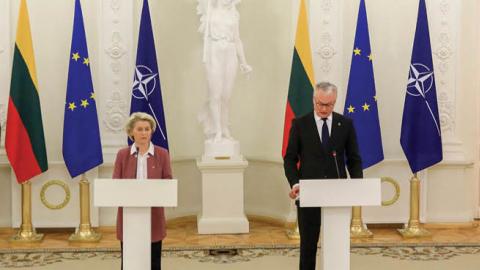Lithuania, a Baltic state of 2.8 million with an outsize role in promoting human rights and democracy, is in the crosshairs of Russia and China. Neither Russian President Vladimir Putin nor Chinese leader Xi Jinping has been shy about going after Lithuania. But their recent moves have broader significance, namely testing American and European commitments to allies.
Mr. Putin is raising the temperature on Lithuania by absorbing neighboring Belarus into his security sphere and militarizing Kaliningrad, Russia’s territorial exclave on the Baltic Sea. Mr. Xi is waging a campaign of political and economic retaliation.
The integration of the Baltic states into the North Atlantic Treaty Organization and the European Union in 2004 was a crowning achievement of post-Cold War politics. Lithuania helped lead Europe’s response to the depredations of the dictatorial regime of Alexander Lukashenko in Belarus by sheltering opposition leaders and staking out hawkish positions. This is the latest way in which Vilnius has irritated Mr. Putin, who would like to reclaim Russia’s near abroad as a sphere of influence. In Mr. Putin’s fanciful telling, Lithuania is a major source of Russia’s historical insecurity. That places it high on the list of neighboring states he would like to control.
Lithuania drew China’s fury this year for its decision to leave the 17+1 format—the Beijing-designed framework for dealing with Europe—and by allowing the government of Taiwan to open an office for its representation in Vilnius. Beijing declared an import ban on products with goods made in Lithuania—a move damaging to European companies with factories or supply-chain sources in Lithuania. Continental, a Germany-based automotive supplier, is the latest multinational under Chinese pressure to close operations in Lithuania.
Read the full article in the Wall Street Journal


















